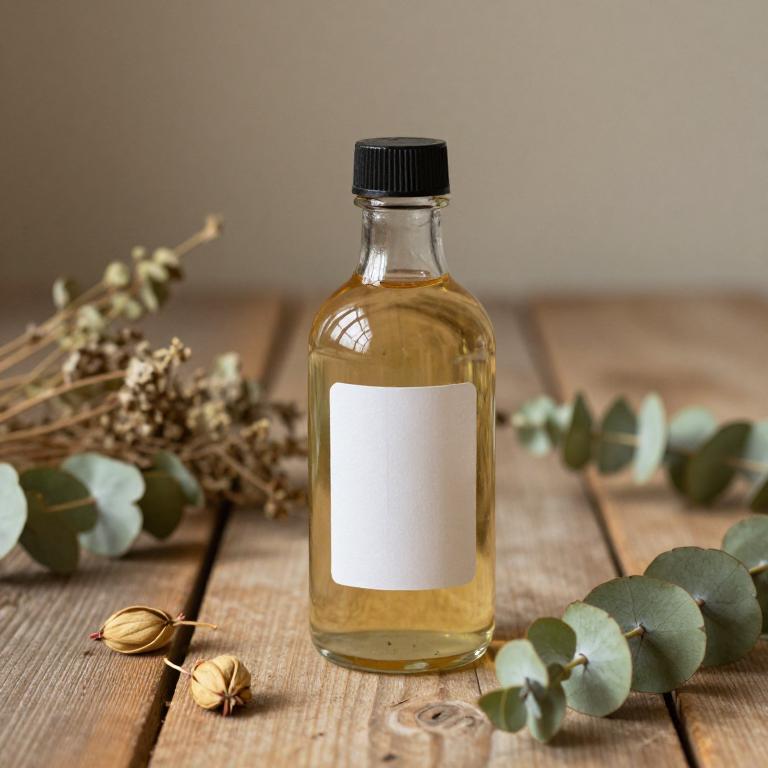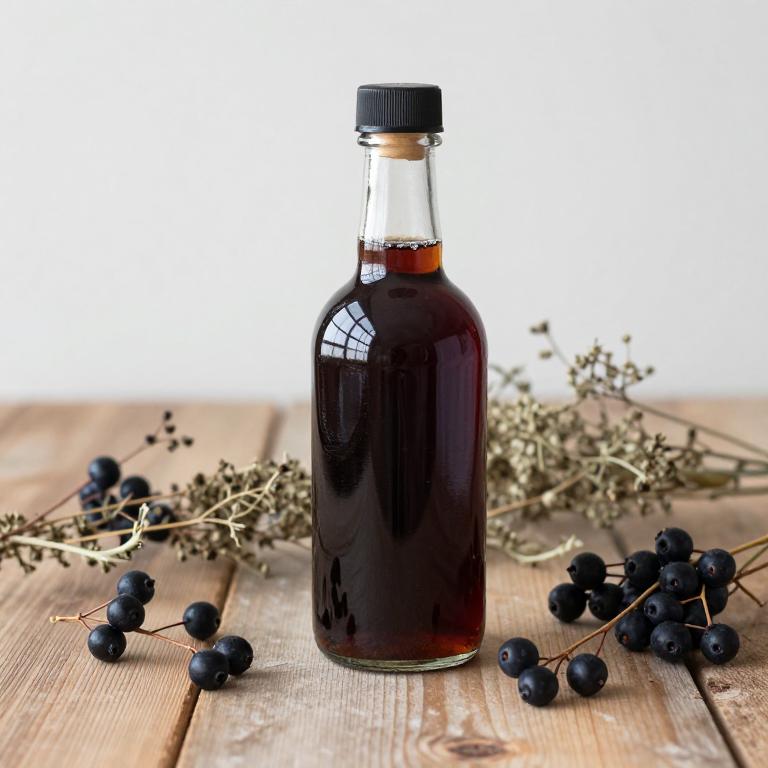10 Best Herbal Syrups For Acute Bronchitis

Herbal syrups are commonly used as a natural remedy for acute bronchitis due to their soothing and anti-inflammatory properties.
These syrups often contain ingredients like ginger, echinacea, honey, and thyme, which are believed to help reduce coughing and ease respiratory discomfort. While they may provide symptomatic relief, they are generally not a substitute for medical treatment in severe cases. It is important to consult a healthcare provider before using herbal syrups, especially for children or individuals with allergies or chronic health conditions.
Overall, herbal syrups can be a complementary therapy when used alongside conventional treatments for acute bronchitis.
Table of Contents
- 1. Thyme (Thymus vulgaris)
- 2. Ginger (Zingiber officinale)
- 3. Eucalyptus (Eucalyptus globulus)
- 4. Licorice (Glycyrrhiza glabra)
- 5. Chamomile (Matricaria chamomilla)
- 6. Ceylon cinnamon (Cinnamomum verum)
- 7. Black elderberry (Sambucus nigra)
- 8. Peppermint (Mentha piperita)
- 9. Rosemary (Rosmarinus officinalis)
- 10. Black pepper (Piper nigrum)
1. Thyme (Thymus vulgaris)

Thymus vulgaris, commonly known as thyme, is often used in herbal syrups to support recovery from acute bronchitis due to its potent antimicrobial and anti-inflammatory properties.
These syrups typically contain essential oils from thyme leaves, which have been traditionally valued for their ability to soothe respiratory discomfort and reduce mucus production. The active compound thymol contributes to the syrup's effectiveness by helping to clear airways and combat respiratory infections. While thyme syrups are generally considered safe for most adults, they should be used with caution in children and individuals with known allergies to the herb.
As a complementary therapy, thyme herbal syrups may help alleviate symptoms of acute bronchitis when used alongside conventional medical treatments.
2. Ginger (Zingiber officinale)

Zingiber officinale, commonly known as ginger, has been traditionally used for its anti-inflammatory and bronchodilating properties, making it a popular herbal remedy for acute bronchitis.
Ginger herbal syrups are often prepared by combining fresh or dried ginger with honey and other natural ingredients to enhance flavor and potency. These syrups can help alleviate symptoms such as coughing, mucus production, and chest congestion by reducing inflammation in the airways. While generally considered safe for most adults, ginger may interact with certain medications and should be used cautiously, especially in individuals with bleeding disorders or those taking anticoagulants.
Despite its traditional use, it is advisable to consult a healthcare provider before using ginger syrup as a primary treatment for acute bronchitis.
3. Eucalyptus (Eucalyptus globulus)

Eucalyptus globulus, commonly known as eucalyptus or gum tree, is widely used in herbal syrups for the treatment of acute bronchitis due to its anti-inflammatory and expectorant properties.
These syrups often contain extracts of eucalyptus leaves, which help to loosen mucus and reduce congestion in the airways. The active compounds, such as cineole and terpenes, contribute to the soothing effect on the respiratory system. Herbal syrups made from eucalyptus globulus are typically safe for adults and children when used as directed, though they should not replace medical advice for severe cases.
Their natural formulation makes them a popular choice for those seeking alternative or complementary remedies for acute bronchitis.
4. Licorice (Glycyrrhiza glabra)

Glycyrrhiza glabra, commonly known as licorice root, has been traditionally used in herbal medicine for its anti-inflammatory and expectorant properties.
Herbal syrups made from glycyrrhiza glabra are often employed to alleviate symptoms of acute bronchitis, such as coughing and mucus production. The active compounds in licorice, including glycyrrhizin and flavonoids, may help reduce airway inflammation and soothe irritated respiratory tissues. However, prolonged use of licorice syrup can lead to side effects like hypertension and electrolyte imbalances due to its mineralocorticoid-like effects.
As a complementary therapy, glycyrrhiza glabra syrups should be used under the guidance of a healthcare professional, especially for individuals with pre-existing medical conditions.
5. Chamomile (Matricaria chamomilla)

Matricaria chamomilla, commonly known as chamomile, is often used in herbal syrups to support respiratory health, including in cases of acute bronchitis.
These syrups typically contain a concentrated extract of the dried flowers of the plant, which are rich in essential oils and flavonoids known for their anti-inflammatory and soothing properties. The calming effects of chamomile may help reduce coughing and ease irritation in the airways, providing symptomatic relief for individuals with acute bronchitis. While not a cure, chamomile syrup is often considered a complementary therapy to support the body's natural healing process.
It is important to consult with a healthcare provider before using any herbal remedy, especially for children or those with existing medical conditions.
6. Ceylon cinnamon (Cinnamomum verum)

Cinnamomum verum, also known as true cinnamon, has been traditionally used in herbal remedies for its anti-inflammatory and antimicrobial properties.
When prepared as a herbal syrup, it may help alleviate symptoms of acute bronchitis by soothing irritated airways and reducing mucus production. The essential oils in cinnamon, such as cinnamaldehyde, are believed to have a warming effect that can ease chest congestion and coughing. However, it is important to consult a healthcare professional before using cinnamon syrup, especially for individuals with diabetes or those taking blood-thinning medications.
While some studies suggest potential benefits, more research is needed to confirm its efficacy and safety for treating acute bronchitis.
7. Black elderberry (Sambucus nigra)

Sambucus nigra, commonly known as elderberry, is often used in herbal syrups to support immune function and alleviate symptoms of acute bronchitis.
These syrups are typically prepared with a blend of elderberries, other herbs, and honey or maple syrup, providing a soothing effect on the respiratory tract. While there is limited clinical evidence on its efficacy for acute bronchitis, some studies suggest that elderberry may help reduce the duration and severity of respiratory infections due to its high antioxidant and antiviral properties. However, it is important to consult a healthcare provider before using elderberry syrups, especially for individuals with chronic conditions or those taking medications.
As a complementary therapy, sambucus nigra syrups may offer relief from coughing and congestion associated with acute bronchitis when used alongside conventional treatments.
8. Peppermint (Mentha piperita)

Mentha piperita, commonly known as peppermint, is often used in herbal syrups to alleviate symptoms of acute bronchitis due to its soothing and decongestant properties.
These syrups can help reduce coughing by relaxing the muscles in the respiratory tract and easing the irritation that accompanies bronchial inflammation. The menthol content in peppermint provides a cooling effect that can soothe the throat and make breathing more comfortable. While not a cure for acute bronchitis, peppermint herbal syrups may offer symptomatic relief and support the body's natural healing process.
As with any herbal remedy, it is advisable to consult a healthcare professional before use, especially for children or individuals with existing health conditions.
9. Rosemary (Rosmarinus officinalis)

Rosmarinus officinalis, commonly known as rosemary, has been traditionally used in herbal syrups for its potential therapeutic effects on respiratory conditions such as acute bronchitis.
These syrups often combine rosemary with other herbs like thyme, eucalyptus, and licorice to enhance their expectorant and anti-inflammatory properties. The essential oils in rosemary, particularly cineole and camphor, may help soothe irritated airways and reduce mucus buildup in the lungs. While herbal syrups are generally considered safe for short-term use, they should not replace prescribed medical treatments for severe cases of bronchitis.
It is advisable to consult a healthcare professional before using rosemary-based syrups, especially for children or individuals with known allergies or chronic health conditions.
10. Black pepper (Piper nigrum)

Piper nigrum, commonly known as black pepper, has been traditionally used in herbal medicine for its potential therapeutic properties.
While it is not a standalone treatment for acute bronchitis, some herbal syrups containing piper nigrum may be used as complementary therapy to support respiratory health. The active compound, piperine, is believed to have anti-inflammatory and antioxidant effects that may help reduce bronchial irritation and mucus production. However, it is important to consult with a healthcare provider before using any herbal remedies, as they may interact with other medications or have side effects.
These syrups are often combined with other herbs like eucalyptus or thyme to enhance their effectiveness in alleviating symptoms of acute bronchitis.